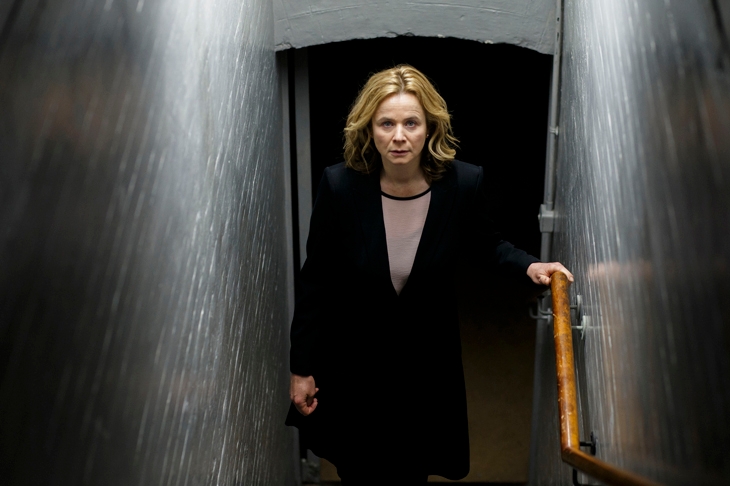The mid-life crisis novel, I think it’s fair to say, is traditionally a male form. But in Louise Doughty’s Apple Tree Yard, the person feeling a bit trapped in what might seem a pretty nice life — while also fretting about how much (or how little) sex the rest of it will contain — is fiftysomething Yvonne Carmichael: wife, mother and all-round radiator of female competence.
In BBC1’s adaptation of Apple Tree Yard (Sunday), Yvonne was first heard giving us a brief meditation on the provisional nature of civilised behaviour — a voiceover, it turned out, being delivered as she travelled in the back of a prison van. We then flashed back nine months to when she was in her middle-class pomp, able to dazzle a parliamentary select committee with her knowledge of genetics and still make it home in time for the Tesco order.
But then as she was leaving the Commons, Yvonne (Emily Watson) really did bump into a dark handsome stranger (Ben Chaplin). For my money, his chat-up lines scored higher for originality than erotic charge. Nevertheless, ‘Have you seen the chapel in the crypt?’ evidently did the trick, because a few minutes later the two were having sex against a cupboard wall, even though the stranger got his foot caught in a bucket halfway through. ‘I’ve never done anything like that before,’ Yvonne told him, convincingly, once they’d finished.
Back home, Yvonne studied herself in the mirror, allowing Watson to convey by face alone an impressive variety of emotions, including wonder, puzzlement and shock — before finally settling on pride. She and her husband then had dinner, duly featuring those infallible TV signifiers of ordered bourgeois life: huge wine glasses with a weirdly small amount of booze in the bottom. That night, she reflected in a secret online journal that sex with the stranger was ‘like being eaten by a wolf’ — which, oddly, appeared to be a point in its favour. Certainly, Yvonne went back for more.
Both Watson and the programme itself were extremely good at making us believe in a relationship that Yvonne herself found hard to credit. Yet, once it was in place, Sunday’s episode did perhaps drift for a while, not always observing the boundary between slow-burn and just slow. Until right at the end, that is, when Yvonne was at a work party and a previously mild-mannered colleague suddenly became her violent rapist…
How this links to her being in that prison van is still to be revealed. What does seem clear, though, is that it’ll be worth sticking around to find out. At times, Apple Tree Yard may feel a little self-conscious in its desire to be drama for grown-ups — but drama for grown-ups it is nonetheless.
The Cult Next Door (BBC2, Thursday) began with BBC news reporting in November 2013 that three women had been rescued from a house in Brixton where they’d been held in slavery for 30 years. In fact, as Vanessa Engle’s jaw-dropping documentary showed, the full story was even stranger and more troubling than that.
The captor was Aravindan Balakrishnan, a.k.a Comrade Bala, a Maoist from India who’d arrived in Britain in the 1970s. At first his beliefs were comparatively orthodox: mainly that his job was to prepare the people of ‘the imperialist heartlands’ for the Chinese takeover of the world in 1977. But by 1980, his Workers’ Institute movement (population: ten) had gone underground — which in practice meant that Bala had nine women to boss about. He did so with the aid of an invisible mind-control machine called Jackie, which, he claimed, also caused all of the natural disasters that happened anywhere on Earth. Meanwhile, in a genuine coup, Engle spoke to two of the three women who stayed with Bala to the end, before he was arrested and later sentenced to 23 years for enslavement, violence and sexual abuse.
As a dutiful reviewer, I always note down anything in a programme that’s particularly interesting or extraordinary. With The Cult Next Door, I achieved a new personal best for volume of notes taken, as almost every moment brought new, eye-popping disclosures.
After the Kobe earthquake of 1995, for example, Bala explained to his followers that it had been his and Jackie’s punishment for the fact that, earlier that day, an agent of the British fascist state — or, if you prefer, a pizza-delivery boy — had knocked on his door by mistake. One of the women interviewed still appeared to believe Bala’s idea that you should let your teeth drop out naturally, rather than getting them fixed by a dentist, because they’ll grow back when you’re 100. We also got to see the house rota, complete with the TV programmes Bala permitted his disciples to watch. One Saturday contained the single entry, ‘You’ve Been Framed’.






Comments